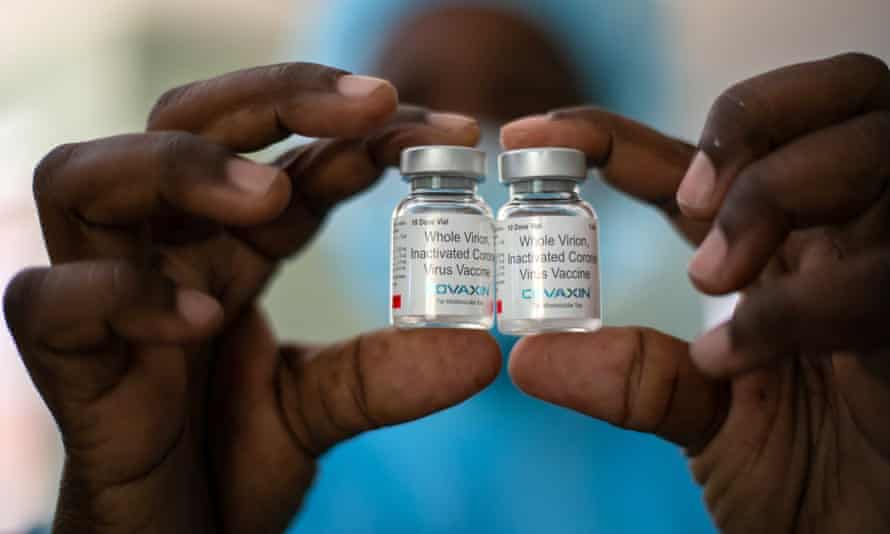
Hundreds of people are being turned away from vaccination centres in Zimbabwe as the country’s supplies of China’s Sinovac vaccine appear to have run out, triggering panic that the government is failing to acquire new stocks.
While the government said that it had taken delivery of more medicines in recent weeks, centres in Harare have not had any stocks for nearly a week and there is growing anger at the failure to communicate acute vaccine shortages, which are being reported around the country.
In Bulawayo, authorities last week suspended vaccination programmes due to a lack of vaccines.
At Wilkins hospital in the capital, Harare, people demanded an explanation from the matron after nurses turned away dozens of people who had arrived for their second dose of Sinovac.
The hospital, Harare’s leading Covid-19 referral centre, is now administering only India’s Covaxin jab, the uptake of which remains low among Zimbabweans.
“We only have Covaxin for the second jab. We do not have the Sinovac second dose. If you are waiting for the Sinovac second dose, check towards the end of the week. We are still waiting for deliveries. They delivered Covaxin yesterday, we hope the Sinovac will come soon,” the matron said, to jeers from the crowd.
According to the government, as of 31 May, 675,678 people in Zimbabwe had received their first dose of the Covid vaccine, while 344,400 had received their second.
With a population of 14.6 million, Zimbabwe aims to vaccinate 10 million people. It received 1.5m doses from China, while India donated 35,000 shots of Covaxin.
Many at Wilkins hospital this week were afraid their first dose would lose effectiveness without the second.
The chief coordinator of Zimbabwe’s Covid-19 response, Agnes Mahomva, said: “We have heard such stories of shortages but we asked the Ministry of Health to do an assessment on the ground. All clinics got quantities that are proportional to their size but some moved vaccines faster than others. So the Ministry of Health is currently doing the redistribution of vaccines. Any minute from now we should hear from them.”
Previously a bustling centre vaccinating hundreds of people daily, Wilkins now operates one inoculation table where Covaxin is being administered.
“We only had the second dose sometime last week. We spend most of the time sitting, there is nothing to do. If you see such large centres running dry, it is almost certain that [smaller] polyclinics also do not have any vaccines,” a nurse said.
Mernard Makotore, 50, travelled about 40 miles from Darwendale, a town west of Harare, to get his second vaccine.
“I came here very early only to be told at 8am that there are no vaccines. I was supposed to have come on 20 May, but my mother passed away so I could not get the vaccine. We are getting into the cold season and cases are starting to rise again. The government needs to do something fast,” Makotore said.
“Why did they give us the first dose, if they knew that the second dose would not be available,” he added.
Claudina Maneni, 43, had come with her 70-year-old mother.
“I have been coming here for the past five days and they are telling me the same story. I came here again at 4am with my elderly mother, she desperately needs her second dose because of travel. The minister of finance assured us that he was going to buy more vaccines but there is nothing,” Maneni said.
“We hear that vaccines are now being sold in private practices. This is the corruption that we do not want. Zimbabweans should never tolerate such incompetence.”
Despite initial scepticism about the Sinopharm and Sinovac vaccines, Zimbabweans have been commended by their president, Emmerson Mnangagwa, for overcoming their hesitancy in the past month. He also gave assurances that more vaccines were on their way.
Experts say the government should speed up vaccination as winter may bring more cases, with fears that a third wave could bring the already precarious economy to its knees.



Minister of Finance, Professor Mthuli Ncube, said the country was going to procure 1 million vaccines a month. So far it has only bought 600 000. On 25 May, Africa Day, Mnangagwa gave away 18 twin-cab Isuzu trucks to chiefs, the first batch. The country has 270 chiefs and before the 2018 elections Mnangagwa gave each and everyone of them a new Isuzu truck – a down payment for the chief to campaign for the party in the coming 2023 elections.
So 270 chiefs will each get a new twin-cab Isuzu truck @ US$30 000 will cost a total US$ 8.1 million. This is happening with headman, judiciary, Police and Army and all the other key players who help to run the Zanu PF vote rigging juggernaut costing the nation millions of dollars in foreign currency every month.
Zimbabwe does not have to rely on donated covid-19 vaccines, the country has the money to buy the vaccines if only it had its priorities right. If only the country had competent leaders whose head are full of brain and not ossified fat tissue.